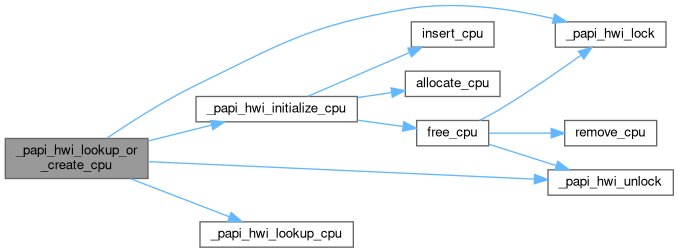Loading...
Searching...
No Matches
Include dependency graph for cpus.c:

Go to the source code of this file.
Functions | |
| static CpuInfo_t * | _papi_hwi_lookup_cpu (unsigned int cpu_num) |
| int | _papi_hwi_lookup_or_create_cpu (CpuInfo_t **here, unsigned int cpu_num) |
| static CpuInfo_t * | allocate_cpu (unsigned int cpu_num) |
| static int | remove_cpu (CpuInfo_t *entry) |
| static void | free_cpu (CpuInfo_t **cpu) |
| static void | insert_cpu (CpuInfo_t *entry) |
| int | _papi_hwi_initialize_cpu (CpuInfo_t **dest, unsigned int cpu_num) |
| int | _papi_hwi_shutdown_cpu (CpuInfo_t *cpu) |
Variables | |
| static CpuInfo_t * | _papi_hwi_cpu_head |
Function Documentation
◆ _papi_hwi_initialize_cpu()
Definition at line 275 of file cpus.c.
276{
278
280 CpuInfo_t *cpu;
282
284 *dest = NULL;
286 }
287
288 /* Call the component to fill in anything special. */
292 continue;
295 free_cpu( &cpu );
296 *dest = NULL;
298 }
299 }
300
301 insert_cpu( cpu );
302
303 *dest = cpu;
305}
Here is the call graph for this function:

Here is the caller graph for this function:

◆ _papi_hwi_lookup_cpu()
◆ _papi_hwi_lookup_or_create_cpu()
Definition at line 59 of file cpus.c.
60{
62
65
67
71 }
72
73 /* Increment use count */
74 tmp->num_users++;
75
77 *here = tmp;
78 }
79
81
83}
int _papi_hwi_initialize_cpu(CpuInfo_t **dest, unsigned int cpu_num)
Definition: cpus.c:275
static CpuInfo_t * _papi_hwi_lookup_cpu(unsigned int cpu_num)
Definition: cpus.c:29
Here is the call graph for this function:

Here is the caller graph for this function:

◆ _papi_hwi_shutdown_cpu()
◆ allocate_cpu()
Definition at line 87 of file cpus.c.
88{
90
91 CpuInfo_t *cpu;
93
94 /* Allocate new CpuInfo structure */
96 if ( cpu == NULL ) {
97 goto allocate_error;
98 }
99
100 /* identify the cpu this info structure represents */
101 cpu->cpu_num = cpu_num;
106 goto error_free_cpu;
107 }
108
109 /* Allocate an eventset per component per cpu? Why? */
110
115 goto error_free_context;
116 }
117
123 goto error_free_contexts;
124 }
125 }
126
127 cpu->num_users=0;
128
130
131 return cpu;
132
133error_free_contexts:
135error_free_context:
137error_free_cpu:
138 papi_free( cpu );
139allocate_error:
140 return NULL;
141}
Definition: papi_internal.h:258
Definition: freebsd.h:62
Here is the caller graph for this function:

◆ free_cpu()
|
static |
Definition at line 190 of file cpus.c.
191{
193 *cpu, ( *cpu )->cpu_num, (*cpu)->num_users);
194
196
198
199 (*cpu)->num_users--;
200
201 users=(*cpu)->num_users;
202
203 /* Remove from linked list if no users */
205
207
208 /* Exit early if still users of this CPU */
209 if (users!=0) return;
210
212
217 // failure = retval;
218 }
219 }
220
224 }
225 }
226
227 if ( ( *cpu )->context ) {
228 papi_free( ( *cpu )->context );
229 }
230
231 if ( ( *cpu )->running_eventset ) {
232 papi_free( ( *cpu )->running_eventset );
233 }
234
235 /* why do we clear this? */
237 papi_free( *cpu );
238 *cpu = NULL;
239}
Here is the call graph for this function:

Here is the caller graph for this function:

◆ insert_cpu()
|
static |
Definition at line 243 of file cpus.c.
244{
246
248 /* 0 elements */
250 entry->next = entry;
252 /* 1 element */
257 } else {
258 /* 2+ elements */
263 }
264
265 _papi_hwi_cpu_head = entry;
266
269}
Here is the caller graph for this function:

◆ remove_cpu()
Definition at line 145 of file cpus.c.
146{
148
150
153
154 /* Find the preceding element and the matched element,
155 short circuit if we've seen the head twice */
156
159 prev = tmp;
160 }
161
164 entry->cpu_num, entry );
166 }
167
168 /* Only 1 element in list */
169
171 _papi_hwi_cpu_head = NULL;
172 tmp->next = NULL;
174 } else {
175 prev->next = tmp->next;
176 /* If we're removing the head, better advance it! */
181 }
183 }
184
186}
Here is the caller graph for this function:



